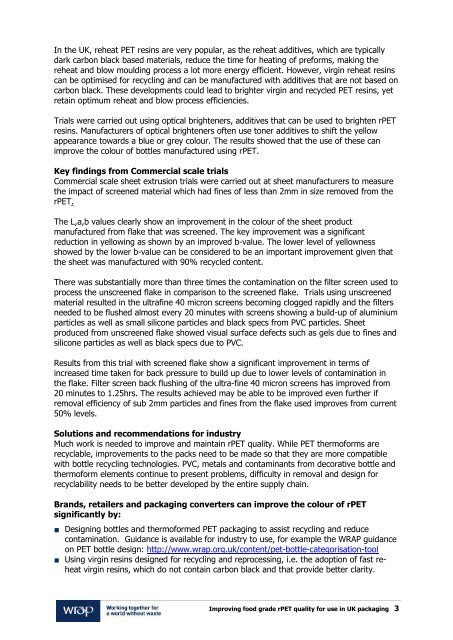rPET Quality Report
You also want an ePaper? Increase the reach of your titles
YUMPU automatically turns print PDFs into web optimized ePapers that Google loves.
In the UK, reheat PET resins are very popular, as the reheat additives, which are typically<br />
dark carbon black based materials, reduce the time for heating of preforms, making the<br />
reheat and blow moulding process a lot more energy efficient. However, virgin reheat resins<br />
can be optimised for recycling and can be manufactured with additives that are not based on<br />
carbon black. These developments could lead to brighter virgin and recycled PET resins, yet<br />
retain optimum reheat and blow process efficiencies.<br />
Trials were carried out using optical brighteners, additives that can be used to brighten <strong>rPET</strong><br />
resins. Manufacturers of optical brighteners often use toner additives to shift the yellow<br />
appearance towards a blue or grey colour. The results showed that the use of these can<br />
improve the colour of bottles manufactured using <strong>rPET</strong>.<br />
Key findings from Commercial scale trials<br />
Commercial scale sheet extrusion trials were carried out at sheet manufacturers to measure<br />
the impact of screened material which had fines of less than 2mm in size removed from the<br />
<strong>rPET</strong>.<br />
The L,a,b values clearly show an improvement in the colour of the sheet product<br />
manufactured from flake that was screened. The key improvement was a significant<br />
reduction in yellowing as shown by an improved b-value. The lower level of yellowness<br />
showed by the lower b-value can be considered to be an important improvement given that<br />
the sheet was manufactured with 90% recycled content.<br />
There was substantially more than three times the contamination on the filter screen used to<br />
process the unscreened flake in comparison to the screened flake. Trials using unscreened<br />
material resulted in the ultrafine 40 micron screens becoming clogged rapidly and the filters<br />
needed to be flushed almost every 20 minutes with screens showing a build-up of aluminium<br />
particles as well as small silicone particles and black specs from PVC particles. Sheet<br />
produced from unscreened flake showed visual surface defects such as gels due to fines and<br />
silicone particles as well as black specs due to PVC.<br />
Results from this trial with screened flake show a significant improvement in terms of<br />
increased time taken for back pressure to build up due to lower levels of contamination in<br />
the flake. Filter screen back flushing of the ultra-fine 40 micron screens has improved from<br />
20 minutes to 1.25hrs. The results achieved may be able to be improved even further if<br />
removal efficiency of sub 2mm particles and fines from the flake used improves from current<br />
50% levels.<br />
Solutions and recommendations for industry<br />
Much work is needed to improve and maintain <strong>rPET</strong> quality. While PET thermoforms are<br />
recyclable, improvements to the packs need to be made so that they are more compatible<br />
with bottle recycling technologies. PVC, metals and contaminants from decorative bottle and<br />
thermoform elements continue to present problems, difficulty in removal and design for<br />
recyclability needs to be better developed by the entire supply chain.<br />
Brands, retailers and packaging converters can improve the colour of <strong>rPET</strong><br />
significantly by:<br />
• Designing bottles and thermoformed PET packaging to assist recycling and reduce<br />
contamination. Guidance is available for industry to use, for example the WRAP guidance<br />
on PET bottle design: http://www.wrap.org.uk/content/pet-bottle-categorisation-tool<br />
• Using virgin resins designed for recycling and reprocessing, i.e. the adoption of fast reheat<br />
virgin resins, which do not contain carbon black and that provide better clarity.<br />
Improving food grade <strong>rPET</strong> quality for use in UK packaging 3



